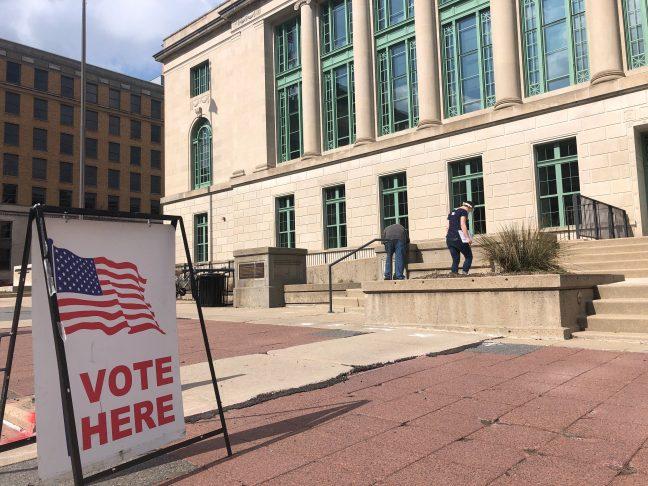This past March, as nearly every University of Wisconsin student was frantically packing their bags in the midst of the pandemic, the last thought on anyone’s mind was how they would vote in the Wisconsin primary.
When your columnist first registered to vote in Wisconsin as an out-of-state student, she vividly remembers telling her friend that they both would have plenty of time to get their Voter IDs at the Wiscard office before the April 7 primary election. Come mid-March, both your columnist and friend were at home in New York, unable to vote absentee without the photo ID Wisconsin law requires.
Seven cases of COVID-19 in Milwaukee linked to April 7 election
Out-of-state students who plan to vote in Wisconsin state and local elections during their tenure at UW cannot vote in Wisconsin, even if they possess a state government-issued ID, voter registration, student ID and proof of enrollment. Wisconsin voter laws require a state-issued photo ID be presented at the polls. A student’s campus photo ID may be used only if it contains the student’s name, issuance date, an expiration date not more than two years after the issuance date and the student’s signature, which renders Wiscards non-compliant as voter IDs.
Out-of-state students have to jump a hurdle in-state students don’t to vote. In-state students already possess a Wisconsin-issued photo ID card compliant with current voter laws — their driver’s licenses. The burden of obtaining a proper voter ID card falls on out-of-state students, and not in-state students. This was the basis of a lawsuit against the state filed by Common Cause, a national democracy reform organization.
At the crux of Common Cause’s lawsuit is its demand that Wisconsin laws remove enforcement of the issuance date, expiration date and signature requirements on photo ID laws.
If implemented this would ultimately allow UW students to use their Wiscard for voting. In 2011, a Republican-led legislature put these requirements into effect, which stated that the expiration date for a compliant voter ID must not exceed two years, even if issued by a four-year institution.
Madison officials work through primary voting uncertainties amidst COVID-19 outbreak
Executive Director of Common Cause Wisconsin Jay Heck posits that this legislation exists to discourage student voting.
“Obviously a lot of college students are Republican, but their calculation is that more college students would likely vote for Democrats,” Heck said.
It may be advantageous for Republicans to prevent students from voting, as nearly 60% of voters between the ages of 18 and 25 identify as Democrats.
Regardless, Wisconsin voter laws are unnecessarily redundant, given that this is the only law that requires separate proof of enrollment when using a student ID to vote, in addition to the other required forms of ID out-of-state students must obtain.
It is clear that voting as an out-of-state student is more difficult, especially when considering the many incoming freshmen who are likely unaware of these regulations.
During the past election day, 989 compliant photo IDs were issued, proof that nearly 1,000 students had to scramble just to cast their ballot alongside their in-state peers.
The Common Cause lawsuit is one of three circulating right now arguing against essentially meaningless voter laws, including a 2015 lawsuit filed by One Wisconsin Institute that claims the requirement for a separate student ID with explicit issuance and expiration dates does not protect against fraudulent voting.
While it is often the most popular argument in favor of instituting voter ID requirements, voter ID laws are proven to be ineffective against voter fraud, which doesn’t actually occur as often as these laws imply.
What voter ID laws truly prevent is high voter turnout, simultaneously disenfranchising about 21 million voters who lack proper voter IDs. As it pertains to the roughly 340,000 college students in Wisconsin alone, voter ID laws only serve to prevent a group with already low turnout from voting.
In as valuable a voting bloc as Wisconsin, out-of-state students’ votes likely carry a lot more sway here than at home.
Data gathered from the 2016 election results shows that Donald Trump won Wisconsin by a narrow margin of about 23,000 votes, underscoring the importance of every vote, no matter who your ballot supports.
With no end date to coronavirus pandemic, absentee voting key to preserving democracy
Of course, this means that doing away with Wisconsin’s excessively stringent voter ID regulations might not be in the state’s Republican party’s interest, as student voters generally lean Democratic.
Still, Common Cause’s lawsuit is valid in that many current restrictions not only lack proven efficacy in preventing voter fraud — for instance, a two-year expiration date — but also create hurdles for a specific population of students in Wisconsin, which as the lawsuit argues, is unconstitutional.
The process of voting in Wisconsin should not be an added stress for out-of-state students, eager to vote for the first time in a state where their vote directly impacts the public institution we attend. Instead, voter ID policy in Wisconsin should be altered, in line with Common Cause’s demands, to allow university-issued IDs to serve as compliant photo IDs at the polls.
For now, students can pick up their voter-compliant ID from the Wiscard office during normal business hours, which have been adjusted to Mondays and Thursdays from 8:30 a.m. to 5 p.m.
Anne Isman ([email protected]) is a sophomore studying economics.














